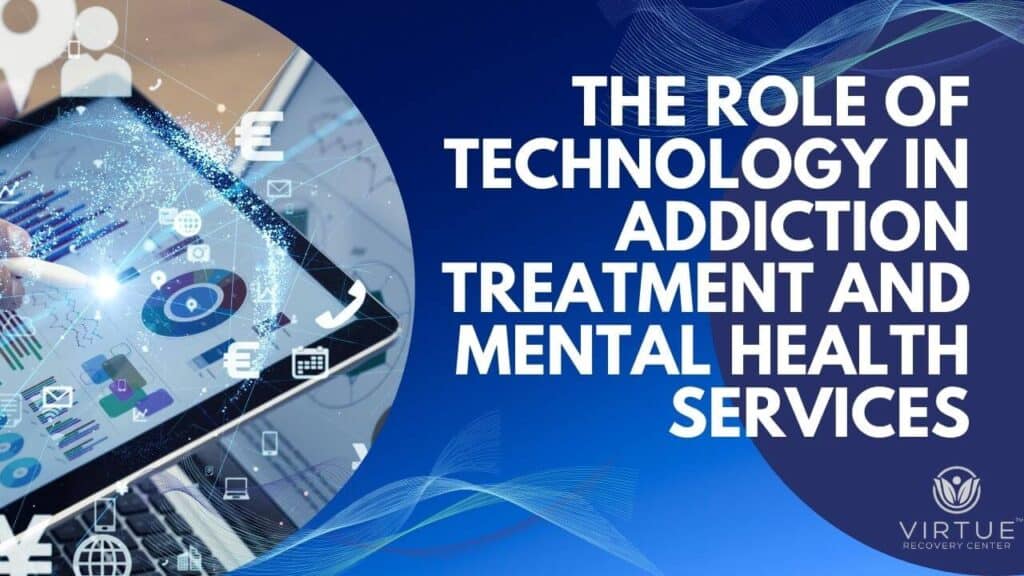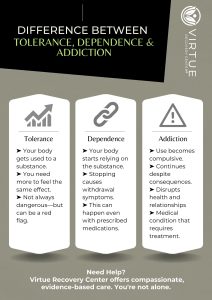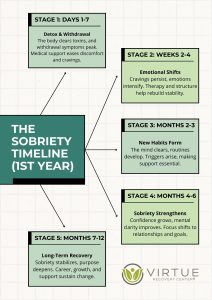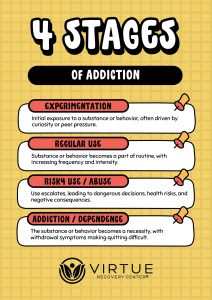In a world where over 21 million Americans battle with addiction, yet only 10% receive treatment, the emergence of technology in addiction treatment and mental health services heralds a beacon of hope. Redefining recovery paradigms, addiction treatment technology enhances the customizability and reach of treatments, offering reprieve amidst an overwhelming demand for care. Applications such as telehealth addiction treatment services and digital health solutions have surged, promising an avenue for breakthroughs in accessibility and quality of mental health care.
Revolutionizing patient engagement, technology integrates cutting-edge tools that empower individuals along their recovery path. The versatility of these digital platforms enables practitioners to provide immediate support, integrating evidence-based therapies with the convenience of anytime-access. Amidst the diversification of treatment modalities, technology stands as a pivotal ally in the fight against addiction.

Key Takeaways
- Technology is crucial for expanding treatment to the 90% of Americans who struggle with addiction but do not receive help.
- Digital advancements in addiction treatment lead to more personalized and accessible care.
- Emerging tools like mobile apps and online platforms enhance patient engagement and support.
- Telehealth services have become essential in breaching the gap between patients and providers, especially in remote areas.
- Modern addiction treatment correlating with technology holds potential for improving recovery outcomes.
- Adoption of technology in mental health services heralds a new era of immediate, anytime-access to care.
Emerging Technologies Transforming Addiction Recovery
The landscape of addiction recovery is being reshaped by emerging technologies that leverage the power of virtual reality therapy, mobile apps for addiction recovery, and AI in addiction treatment. These tools offer new horizons in the way patients engage with their treatment, making recovery an interactive and data-driven journey.
Virtual reality therapy serves as a groundbreaking method for patients to experience and navigate challenging scenarios in the safety of a virtual space. This controlled exposure aids in the development of coping strategies and resilience. On the other hand, mobile apps offer a portable support network, granting users access to a myriad of recovery resources tailored specifically to their needs. AI’s predictive analytics play a critical role in personalizing treatment plans, allowing healthcare providers to anticipate and act upon potential relapse events before they occur.
- Virtual reality exposure therapy scenarios
- Progress tracking through mobile app features
- AI-derived insights for customized patient care
| Technology | Application in Addiction Recovery | Benefits |
|---|---|---|
| Virtual Reality Therapy | Controlled exposure to triggers | Safe environment for skill development |
| Mobile Apps | On-the-go support and resources | Encourages consistent self-management |
| AI in Treatment | Data analysis for predictive care | Proactive approach to prevent relapse |
As we continue to innovate, the interplay between these technologies paves the way for a more robust, efficient, and patient-centric approach to addiction recovery.
Technology in Addiction Treatment: A New Frontier
The advent of technology has ushered in a promising era for addiction treatment, offering tools that enable personalized recovery support, predictive healthcare, and immersive healing experiences. Harnessing the power of machine learning and cutting-edge digital platforms, clinicians and patients are experiencing the benefits of innovation in creating a more responsive and effective treatment landscape.
Mobile Apps for Personalized Recovery Support
Mobile applications are at the forefront of providing personalized recovery support, revolutionizing the way individuals engage with their addiction treatment plans. Features like sobriety trackers keep individuals anchored to their goals, while tailored motivational content spurs them on their journey to wellness. With functionality enabling users to receive therapy session reminders, these apps are like holding a personal recovery assistant in the palm of your hand.
AI and Machine Learning for Predictive Healthcare
The clinical application of AI and machine learning is transforming predictive healthcare in addiction treatment. By analyzing complex data patterns and patient histories, these technologies empower clinicians to deliver a more nuanced and customized approach. Early detection of behaviors that may indicate a risk of relapse enables a preemptive response, thereby enhancing the likelihood of long-term recovery success.
Virtual Reality Therapy: Immersive Healing Experiences
Virtual reality therapy (VRT) provides immersive healing experiences, a novel approach in the therapeutic arsenal against addiction. VRT offers a controlled yet lifelike environment where patients can safely confront and work through their triggers, a process essential to the development of effective coping strategies. This form of therapy extends the boundaries of traditional treatment and has shown great potential in improving clinical outcomes.
The Impact of Digital Health Solutions in Mental Healthcare
As the healthcare industry continues to embrace innovative solutions, the impact of digital health solutions on mental healthcare is increasingly evident. Technology-based interventions, particularly those like virtual reality therapy, are rewriting the narrative of treatment efficacy and patient engagement. These advanced digital tools are instrumental in creating more tailored and patient-centric therapy experiences.
Digital health solutions are pivotal in expanding the reach of quality mental healthcare, providing services that are not only scalable but also adaptable to the needs of individuals across diverse geographic and socio-economic backgrounds. By utilizing cutting-edge technology, these interventions provide a bridge to overcome traditional barriers of access to care.
Implementing virtual reality therapy has shown success across various conditions including anxiety disorders, PTSD, and phobias. By simulating environments or scenarios related to patients’ conditions, VR allows for a safe space for exposure therapy and essential skill-building exercises. The controlled, immersive nature of VR therapy helps patients confront their challenges in a secure environment, thereby greatly enhancing the overall mental healthcare impact.
- Accessibility: Technology opens up channels for therapy that might not have been possible otherwise, especially for remote or underserved communities.
- Engagement: Interactive and gamified elements keep patients engaged in their treatment plans, increasing adherence and improving outcomes.
- Data Collection: Continuous monitoring and data collection enable healthcare providers to make informed decisions based on real-time insights into patient progress.
In conclusion, the incorporation of digital health solutions is not just an adjunct but a fundamental shift towards a more efficient, effective, and inclusive mental health care framework. By leveraging the power of technology-based interventions, providers can deliver high-quality care that resonates with the connected, tech-savvy generation, and holds promise for groundbreaking advancements in the fields of psychology and psychiatry.
Telehealth: Bridging the Gap in Addiction Treatment Accessibility
The advent of telehealth has initiated a paradigm shift in addiction treatment, presenting innovative solutions to historic obstacles. With a focus on enhancing patient care, telehealth addiction treatment leverages technology to expand the horizons of recovery support. This digital approach has proven to be a cornerstone in overcoming geographic barriers, promoting remote counseling efficacy, and tailoring flexible treatment schedules to accommodate the various demands of diverse populations.
Overcoming Geographic Barriers to Care
Telehealth addiction treatment has emerged as a vital tool for individuals in remote or underserved regions, granting access to quality care without the constraints of physical distance. By overcoming geographic barriers, telehealth ushers in a new era where location no longer dictates the availability and quality of addiction treatment services. This progression is pivotal in achieving equity in healthcare and empowering individuals to seek the help they need, wherever they may be.
Flexible Treatment Schedules for Diverse Populations
The inherent flexibility of telehealth services is particularly advantageous for diverse populations who might otherwise struggle to engage with traditional treatment protocols. This includes, but is not limited to, working professionals, parents, and caregivers who can benefit from the convenience of personalizing their treatment schedules, thus allowing them to reconcile their recovery process with personal and occupational responsibilities.
The Efficacy of Remote Counseling and Therapy Sessions
In evaluating the impact of telehealth, the efficacy of remote counseling and therapy sessions cannot be understated. Studies and clinical observations have shown that telehealth maintains therapy adherence and patient engagement levels, mirroring the traditional in-person counseling effectiveness. The successful continuation of these services, amidst challenges like the COVID-19 pandemic, is a testament to the role of telehealth in safeguarding uninterrupted care.
| Benefits of Telehealth | Impact on Patient Care |
|---|---|
| Access to Specialized Providers | Patients receive care from experts nationwide |
| Reduction in Healthcare Disparities | More equitable healthcare distribution |
| Cost-Effectiveness | Decreased travel and associated expenses |
| Data-Driven Insights | Treatment plans refined by continuous feedback |
| Privacy and Anonymity | Encourages participation among patients seeking confidentiality |
Wearable Devices and Their Role in Monitoring Recovery Progress
The advent of wearable devices has brought a paradigm shift in the realm of addiction treatment technology and rehabilitation technology. These gadgets have become indispensable in monitoring recovery progress, enabling health professionals to gather and analyze critical physiological data with unprecedented ease and accuracy.
Equipped with sensors, wearable technology can track various health metrics that are crucial for recovery, such as heart rate variability, stress levels, and sleep quality. This objective data is instrumental in tailoring patient care, providing a nuanced understanding of an individual’s day-to-day recovery journey, and allowing for timely adjustments to their treatment plan.
| Wearable Device Features | Benefits in Recovery Monitoring |
|---|---|
| Heart Rate Monitoring | Gauges stress response and overall cardiovascular health |
| Sleep Pattern Tracking | Assesses quality of sleep and its impact on recovery |
| Activity Level Measurement | Encourages physical activity, vital for holistic rehabilitation |
| Stress Management Tools | Provides biofeedback to aid in emotional regulation |
These insights pave the way for a more personalized and responsive approach to recovery, ensuring that each patient’s unique physiological patterns inform their rehabilitation journey. The real-time nature of these wearable devices also empowers patients, giving them a sense of control and involvement in their treatment—an essential aspect of sustained recovery.
As wearable technology continues to evolve, its role in monitoring recovery progress will likely expand, incorporating more sophisticated sensors and analytics capable of delivering deeper insights into the complex process of recovery. Therapists and medical professionals are continually discovering innovative ways to integrate these devices into more comprehensive, technology-driven recovery programs.
In conclusion, the seamless integration of wearable devices in the monitoring of recovery provides a valuable asset to both healthcare providers and patients, one that champions a more data-driven, personalized, and ultimately effective journey toward addiction-free living.
Integrating Online Support Groups into Addiction Recovery Plans
The journey to recovery from addiction is a continuous process that benefits greatly from the supportive network provided by online support groups. Not only do these groups supplement traditional addiction recovery plans, but they also offer unique advantages that can enhance the recovery experience.
Building Communities for Mutual Support and Accountability
Mutual support is the cornerstone of effective recovery strategies, and online platforms offer a safe haven where individuals can connect with peers who understand their struggles. These communities foster a sense of accountability, which is critical in maintaining sobriety and preventing relapse. The shared commitment to recovery builds a strong support system that can be accessed anytime, reinforcing the importance of community in the healing process.
Real-time Peer Support and Encouragement
With the power of digital connectivity, online support groups provide real-time peer support, allowing individuals to receive instant feedback and encouragement. From celebrating milestones to navigating moments of temptation, the immediacy of support is invaluable. The constant availability of a supportive network offers a lifeline in moments of need, facilitating immediate reinforcement and strength from fellow members who are on the same path to recovery.
Anonymity and Accessibility for Sustained Engagement
The anonymity provided by online groups encourages more people to seek help and openly share their experiences without fear of judgment. This level of privacy promotes sustained engagement, as individuals can be candid about their challenges and victories. Additionally, the accessibility of these groups removes barriers to participation, allowing for consistent and flexible engagement that adapts to personal schedules and lifestyles.
| Benefit | Description | Impact on Recovery |
|---|---|---|
| Anonymity | Participants can maintain privacy, which encourages openness and honesty. | Reduces stigma and facilitates a safe space for sharing. |
| Accessibility | 24/7 availability regardless of location, making support readily accessible. | Enables continuous and flexible support, fostering regular engagement. |
| Mutual Support | Interactions with peers facing similar challenges. | Enhances motivation and fosters responsibility for personal and communal well-being. |
| Real-time Interaction | Immediate communication and feedback from group members. | Promotes timely support and helps in crisis management. |
As the integration of online support groups with traditional treatment plans becomes more commonplace, it is essential to recognize their value within the broader landscape of addiction recovery and mental health services.
Tech-based Interventions for Comprehensive Substance Abuse Treatment
The landscape of substance abuse treatment is evolving with the integration of tech-based interventions, which are reshaping the way health practitioners and patients approach addiction. By leveraging the potential of digital health solutions, treatment programs are becoming increasingly comprehensive, providing personalized care that can be dynamically adjusted to meet the changing needs of individuals on their path to recovery.
includes a variety of tools that serve to enhance traditional therapeutic methods. Key components such as e-therapies, interactive educational modules, and digital assessments, when used in conjunction with in-person counseling, build a robust framework for
comprehensive substance abuse treatment
. These interventions are not only supportive but also vital in monitoring progress and identifying potential risks for relapse.
- Electronic Therapies (e-Therapies): Providing flexibility and accessibility, e-therapies include digital counseling sessions, online cognitive behavioral therapies, and other platforms where patients can engage in therapeutic activities at their convenience.
- Digital Assessment Platforms: Utilizing data analytics to evaluate patient progress, these platforms offer insight into the effectiveness of treatment plans and help in the early detection of possible challenges in recovery.
- Data-Driven Treatment Planning: Through the collection and analysis of patient data, tailored treatment strategies can be formulated, ensuring that each individual’s unique journey can be optimally supported with evidence-based interventions.
As technology in addiction treatment continues to advance, it promises not only to augment existing therapeutic practices but to also pave the way for new, innovative strategies that may revolutionize the field. The synergy between technology and traditional care strategies creates a multidimensional treatment environment that is well-equipped to provide comprehensive substance abuse treatment aligned with contemporary needs and lifestyles.
The Advantages and Challenges of Adopting Addiction Treatment Technology
As the healthcare landscape continually evolves, addiction treatment technology brings a myriad of benefits. The advantages of such technological advancements include enhancing the efficiency of service delivery, offering more personalized care, and improving patient engagement. Yet, these advancements are not without challenges. One major concern is equitable technology access, especially for those from underprivileged backgrounds. In addition, protecting patient privacy becomes a paramount issue in this digital age. Moreover, training healthcare providers to skillfully use these advanced tools is essential for the successful integration of technology into addiction treatment programs.
Ensuring Equitable Technology Access to Underprivileged Groups
Equitable access to addiction treatment technology is critical to ensure that all individuals can benefit from the latest innovations, regardless of their socioeconomic status. Efforts must be channeled towards providing resources that bridge the gap, ensuring that these tools are accessible to everyone in need. This goes beyond mere availability, extending to affordability and usability of these technologies.
Protecting Patient Privacy in a Digital Era
The digital handling of health information necessitates stringent cybersecurity measures and policies to protect patient data. Patients and healthcare providers alike need guarantees that sensitive information stays confidential and safe from breaches.
Training Healthcare Providers to Utilize Advanced Tools
Healthcare providers must receive ongoing training and support to harness the full potential of addiction treatment technologies. It’s not just about being able to use these tools—it’s also about understanding the data interpretation, ethical considerations, and the integration of technology with traditional treatment methodologies.
| Advantages | Challenges |
|---|---|
| Personalized treatment plans | Need for specialized training |
| Higher efficiency in service provision | Creating equitable access |
| Enhanced engagement with patients | Securing patient privacy |
| Real-time data monitoring | Interpreting complex data |
| Scalability of services across regions | Cost-barriers for resource-poor settings |
This intersection between potential benefits and challenges presents a landscape where continuous innovation is matched by steadfast commitment to ethics, equity, and excellence in healthcare delivery.
Conclusion
The evolution of addiction treatment through the integration of cutting-edge technology represents a paradigm shift in mental health services. Recovery technology integration has laid the foundation for more effective, accessible, and personalized care, heralding a new era of patient empowerment and treatment precision. As these digital healthcare advancements continue to unfold, they showcase an inspiring fusion of innovation and empathy, with the potential to foster transformative recovery journeys.
However, as we move forward with this digital transformation, challenges such as safeguarding patient privacy, democratizing technology access, and equipping healthcare providers with the necessary skills to leverage these tools must be met with strategic foresight. It is only through conscientious use that these technologies can realize their full impact on mental wellness accessibility, upholding the principles of ethical practice in this digitally inclined healthcare landscape.
In summary, the intersection of technology and healthcare is poised to enhance the lives of individuals coping with addiction, reshaping the future of mental wellness. By embracing recovery technology integration and continuously refining our approach to these tools, we ensure a steadfast journey toward an inclusive, technology-assisted path to addiction-free living that respects the importance of both privacy and personalized care.
The Advantages and Challenges of Adopting Addiction Treatment Technology
How is technology changing the landscape of addiction treatment and mental health services?
Technology is enhancing the effectiveness and accessibility of care through digital health solutions such as telehealth platforms, mobile apps, and virtual reality therapies. These technological advances offer more personalized and engaging treatment plans, improve patient outcomes, and make mental health services accessible to a wider demographic.
What role do mobile apps play in addiction recovery?
Mobile apps function as personal recovery assistants by providing resources like sobriety trackers, motivational content, and therapy session reminders. They empower individuals in addiction recovery with tools for behavioral change, self-management, and ongoing support.
What is virtual reality therapy, and how does it help in addiction treatment?
Virtual reality therapy creates immersive environments to safely confront and manage addiction triggers. It allows individuals to practice coping mechanisms and exposure therapy in a controlled setting, enhancing the therapeutic impact and aiding in the recovery process.
How does AI contribute to addiction treatment?
AI and machine learning help in predictive healthcare by analyzing patient data to tailor treatment plans and forecast potential relapse risks. This data-driven approach enables clinicians to customize interventions proactively, thereby assisting in the management and prevention of addiction.
What immersive healing experiences does virtual reality therapy offer?
Virtual reality therapy offers immersive healing experiences by simulating real-life scenarios that individuals may encounter, providing a safe space for exposure therapy and skill-building to confront and cope with their compulsions and fears.
How does personalized recovery support enhance addiction treatment?
Personalized recovery support through mobile apps and technology-based interventions allows treatments to adapt to individual patient needs, aiding in the creation of more detailed, effective, and patient-centered recovery plans.
Can predictive healthcare and machine learning improve addiction treatment outcomes?
Yes, predictive healthcare and machine learning can significantly improve addiction treatment outcomes by identifying patterns in patient behaviors and customizing interventions to prevent relapses, thus enhancing the personalized care offered to individuals.
How are digital health solutions impacting mental healthcare?
Digital health solutions provide scalable, efficient, and engaging interventions that can address a range of mental health conditions. They amplify the reach and effectiveness of treatment and cater to patients familiar with technology, enhancing both the quality and accessibility of mental healthcare.
How does telehealth overcome geographic barriers in addiction treatment?
Telehealth enables individuals in rural or underserved areas to access quality addiction treatment services from their homes. This reduces disparities in healthcare access by overcoming logistical and physical distance barriers.
In what ways does telehealth provide flexible treatment schedules?
Telehealth offers the flexibility to schedule treatment sessions that fit into the unique lifestyles of diverse populations, including working professionals and caregivers. This inclusivity ensures that more people can receive addiction treatment without disrupting their daily responsibilities.
What has been the efficacy of remote counseling and therapy sessions in addiction treatment?
Remote counseling and therapy sessions have proven to be effective by maintaining therapy adherence and patient engagement. This continuation of care through online platforms has been particularly vital during times like the COVID-19 pandemic, where traditional in-person services may be disrupted.
How do wearable devices contribute to monitoring recovery progress?
Wearable devices in rehabilitation collect real-time physiological data—such as heart rate and sleep patterns—which provide valuable insights into a patient’s well-being. Clinicians use this objective data to adjust treatment plans accordingly, and patients get a tangible measure of their progress.
What benefits do online support groups offer in addiction recovery?
Online support groups help build communities where individuals can find mutual support and accountability. They provide a platform for real-time peer support and encouragement, foster shared experiences, reduce isolation, and aid in sustaining long-term recovery efforts.
How does anonymity and accessibility in online support groups enhance recovery engagement?
The anonymity of online support groups allows individuals to seek help without the stigma that may be associated with addiction, while the accessibility ensures they can participate from anywhere, which is crucial for sustained engagement and privacy.
What are tech-based interventions, and how do they contribute to substance abuse treatment?
Tech-based interventions incorporate tools such as e-therapies, digital assessment platforms, and data-driven planning into substance abuse treatment. They enable a more comprehensive and adaptive approach to care by providing tailored and evidence-based treatment options that complement traditional therapies.
How does technology in addiction treatment promote equitable access to care?
Technology can facilitate the scaling up of services and reach underprivileged groups who might otherwise lack access to quality care. However, we must ensure these technologies are accessible and affordable for all, to minimize healthcare disparities.
What are the challenges in protecting patient privacy with the use of technology in addiction treatment?
Ensuring the privacy of sensitive health information in the digital era requires robust cybersecurity measures. This is crucial to safeguard against unauthorized access and data breaches, and to maintain the trust of patients engaging in digital health solutions.
Why is training healthcare providers important for the implementation of advanced technology tools?
Training healthcare providers is essential to fully realize the benefits of advanced technological tools in addiction treatment. Ongoing education and support are necessary to integrate these innovations effectively into clinical practice and to ensure that providers are equipped to use them ethically and effectively.













